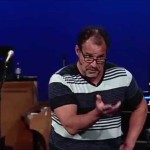We run our website the way we wished the whole internet worked: we provide high quality original content with no ads. We are funded solely by your direct support. Please consider supporting this project.
N.T. Wright on the Whole Sweep of Scripture
Here’s a really fine video message from N.T. Wright on how to read Scripture. So many of the misunderstandings we take away from Scripture happen when we pick out a verse here and there and neglect the whole story. We hope this will bless you and encourage you to “press your nose against the window.”
Category: General
Tags: Bible, Christian Living, N.T. Wright, Scripture
Related Reading

SERMON CLIP: Hell in a Nutshell
Is hell for real? Is it what we have been told it is? Does an all-loving God really torture people there forever? These are a few of the questions that Greg Boyd touches on in this weeks sermon clip. In the full sermon, Greg explores the fallacy of relativism, the singular truth of Jesus as…

Is Islam Inherently Violent? – Further Thoughts
Greg originally posted some thoughts on Islam here. In this video, he discusses some responses he received, and further thoughts on a Kingdom posture toward Muslims.

Podcast: Do You Believe in Sola Scriptura?
Greg gets chummy with Luther and looks at the nature of revelation, considering sola scriptura in light of the cross. http://traffic.libsyn.com/askgregboyd/Episode_0090.mp3

How The Imperfections of Scripture Reveal God Perfectly
In my previous blog I discussed one important implication of a cruciform (“cross-centered”) approach to biblical inspiration. On the cross, I noted, God revealed his perfection by identifying with human imperfection. Jesus in some sense became our sin and our curse. In this light, I argued, why should anyone find it surprising, let alone disturbing,…

Conflicting Pictures of God
In my ongoing reflections on the ReKnew Manifesto, I’ve spent the last two posts (here and here) arguing that nothing is more important in our life than our mental images of God. If so, then the all-important question is: what authority do we trust to tell us what God is like? To most evangelicals, the…

Isn’t the Gospel of John unreliable compared to the Synoptic Gospels?
Question: The Jesus Legend persuaded me that the Gospels are generally reliable. But I remain very skeptical of the reliability of the Gospel of John. It was written long after the Synoptics, and its view of Jesus barely resembles that of the Synoptics. The main reason this skepticism of John’s Gospel is significant is that…
